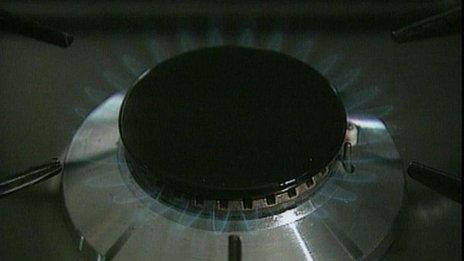Energy: flicking the dimmer switch
- Published

Gas reserves in the UK are reported to be alarmingly low
If you thought George Osborne had an uncomfortable week with that Budget, it's not looking pleasant for his cabinet colleague Ed Davey either.
The Lib Dem Energy Secretary is having to put on an extra sweater as chilly blasts hit his Whitehall office from north, south and east.
From the east, one of the UK's key gas importing pipelines hit technical problems and had to close this morning, sending the wholesale price soaring.
It draws attention to the vulnerability of Britain's supply since it became an importer, and how poorly equipped it is with reserves. The wintry weather has run down stocks.
Energy analysts reckon they may have to use the flexibility of industrial consumers to rein back demand in order to handle shortfalls.
And Davey's Department of Energy and Climate Change is under pressure to do more to incentivise gas-producing utilities to build up more storage capacity. Britain has only an eight of Germany's capacity, though it has a wider range of other options.
And this becomes more of an issue if electricity generating is to rely more on gas, as the Government plans.
Haggling
On that area of energy policy and from the south, Ed Davey had another stark warning issued from Bilbao today, where the chairman of Scottish Power (and its owner, Iberdrola) Ignacio Galan, tackled the delay in providing the guaranteed prices on which generating companies can base their investment decisions.

Brtain has become more dependent on imports as it produces less of its own gas
Iberdrola points out it wants to invest £7bn in Britain, but can't deliver that without more certainty. While the legislation is under way for these Contracts for Difference (effectively guaranteed minimum prices set at different rates for different technologies), the prices are not yet out.
And they're the vital bit. There's much haggling between industry and Whitehall over the prices needed to incentivise new nuclear and back-up baseload plants fuelled by gas.
Proposed prices are due around the middle of the year, and final ones towards the end of the year.
Crunch time
The Bilbao speech was part of that lobbying process. It came only a day after Iain Merchant, with a blast from the north, was far blunter.
The chief executive of Perth-based SSE/Scottish Hydro/Southern Electric cited Ofgem evidence that there's a one in 12 chance of power cuts in the next few years if there isn't swift action to boost generating capacity.
"It appears the Government is significantly underestimating the scale of the capacity crunch facing the UK in the next three years and there is a very real risk of the lights going out as a result," he said.
"The Government can reduce this risk very easily, by taking swift action to provide much greater clarity on its electricity market reforms and bringing forward capacity payments for existing plant from 2018 to 2014."
Business leaders are usually a bit subtler in their lobbying of government, particularly in heavily regulated sectors.
To underline his point, Marchant took 2000 megawatts of capacity out of play, across six sites, and announced a block on further investment until the government acts. He pointed out that raises the one in 12 chance of power cuts.
It means SSE's Peterhead gas plant is operating at less than quarter its capacity, with the blame there placed on the high extra costs of accessing the grid from northern Scotland.
There are plans to change that, bringing at least mainland grid supply charges closer together. But as with everything around energy policy, notably including the 'race' to win government support for carbon capture and storage, it's proceeding at snail's pace.
Lighting the Davey lamps
The emissions licensing regime, shortening the lifespan of coal-burning power stations, has already begun to take big lumps out of capacity.
In recent days, Cockenzie in East Lothian was switched off by owner Scottish Power, and RWE npower followed up by closing Didcot A in Oxfordshire, which had 2000 megawatt capacity.
None of this should surprise Ed Davey or his department. It's been well-signalled for years, going back to Labour days when the Miliband Brothers took turns in his office.
But it looks like it's going to move from warnings to reality on Davey's watch, and even as the lights dim, the political thermometer is on the way up.